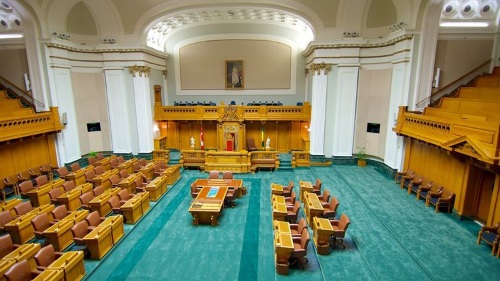Provincial Point of View
January 18, 2018
A beautiful January day in Saskatchewan!
REPORT FROM THE LEGISLATURE

Every province in Canada has now imposed some version of the Trudeau carbon tax – every province except Saskatchewan. Our made-in-Saskatchewan climate change plan will seriously address the challenge of climate change without a carbon tax. The NDP said we should "check with the feds" to see if that's OK.
We don't work for the federal government. We work for the people of Saskatchewan. The NDP may want the Trudeau carbon tax in Saskatchewan, but we're going to stand up for this province.
The Trudeau government has now released a 236-page draft bill to impose its federal carbon tax on provinces that don’t have one. Saskatchewan Justice is reviewing the draft federal legislation.
We continue to believe that the federal proposal to impose a carbon tax backstop on top of provincial climate change plans is a significant overreach by the Government of Canada and is open to Constitutional challenge.
If the Trudeau government decides to try and impose a carbon tax on Saskatchewan families and businesses, our government will continue our fight to prevent that from happening, including taking court action if necessary.
Ten years ago, our newly-elected Saskatchewan Party government set out to reverse years of decline under the NDP by creating one of the strongest investment climates in Canada.
During a decade of our plan in action, Saskatchewan has added over 60,000 more jobs and maintained among the strongest job and wage growth in all of Canada.
This period of exceptional growth has benefited our province in a variety of ways, including new and exciting opportunities to build careers and contribute to our communities.
We know that there have been challenges for our province’s economy and that has put pressure on businesses, jobs, families, and the province’s finances. We will continue to help diversify our economy by supporting growth in value-added production, innovation and technology.
Our government has also passed amendments to The Income Tax Act, extending the lower 2 per cent tax rate to small business income. This is going to provide greater incentive to hire more workers and invest in new capital. These changes build on our 2011 decision to reduce the small business tax rate from 4.5% to 2%, saving small businesses over half a billion dollars by the end of 2017.
Saskatchewan’s economy continues to show signs of momentum with 5,000 new jobs in December and 17% growth in building permits over the past year. Saskatchewan’s 12 per cent corporate income tax rate continues to be competitive and among the lowest in the country, further enhancing our province’s significant advantages when attracting new investment and jobs.
Saskatchewan residents will also continue to benefit from lower provincial Personal Income Tax rates this year, which dropped half a percentage point effective July 1, 2017. Saskatchewan Personal Income Tax rates will drop by another half point on July 1, 2019.
An RBC Economics Provincial Outlook also projects Saskatchewan to lead the country with economic growth of 2.7 per cent for both 2018 and 2019. With a strengthening economy and our population continuing to grow, Saskatchewan is beginning a second decade of growth.
Recently, our government announced how legal cannabis will be sold in Saskatchewan.
The federal government has established very aggressive timelines for the legalization of cannabis and our government is being diligent to ensure the sale and regulation of cannabis in Saskatchewan strikes a balance between public safety and access for consumers.
The Saskatchewan Liquor and Gaming Authority (SLGA) will be issuing approximately 60 cannabis retail permits to private operators in up to 40 municipalities and First Nations communities.
The initial allocation for retail store permits will be in communities with a population of at least 2,500 people, with additional permits being allocated to larger communities. Municipalities and First Nations will have the option to opt out of having a cannabis store in their community if they choose.
Wholesaling and retailing of cannabis will be conducted by the private sector and regulated by SLGA.
Cannabis retailers will be required to establish standalone storefront operations, with the option to also operate an online store. Cannabis stores will be limited to selling cannabis, cannabis accessories, and other ancillary items. Stores must also have the ability to track and report cannabis inventory to help ensure consumers have access to safe, legal product from regulated wholesalers.
Other details will be finalized over the coming weeks with a decision on the minimum age to be made later this spring.
